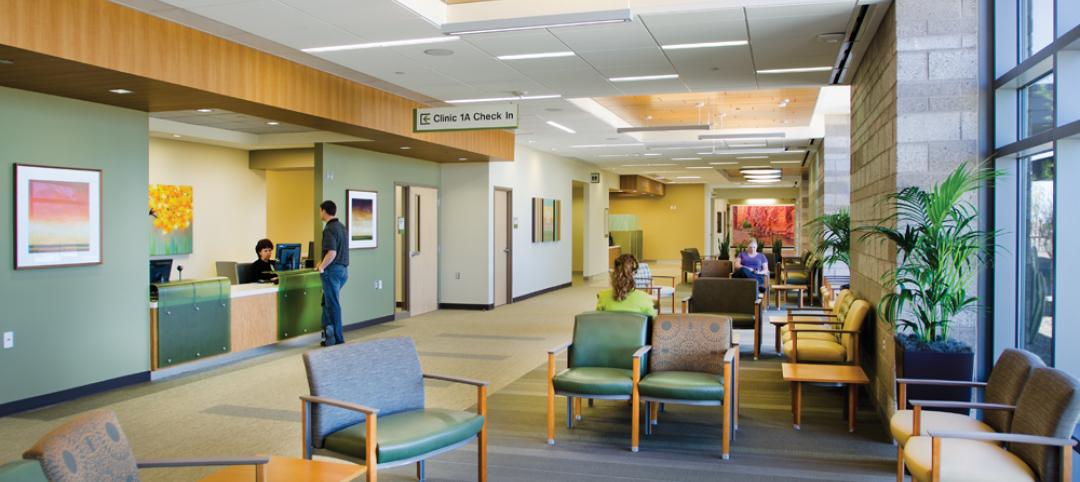Fulton East is a $26 million, 12-story office tower in Chicago’s West Loop. This was one of the first projects that two architectural firms, Lamar Johnson Collaborative (LJC) and BatesForum, worked on jointly.
This week, the firms announced that they had combined to create one business entity with 240-plus professionals and five offices. But the firms had a previous connection in that St. Louis-based BatesForum was 50%-owned by the contracting company Clayco after Clayco merged Bates with its Forum Studio subsidiary in March 2018; and Chicago-based LJC is a Clayco subsidiary, which the contractor acquired in October 2018.
“The future of design is integrated,” says Clayco CEO and founder Bob Clark. “Our integrated delivery model will set a new standard by completely disrupting the inefficiency of the traditional paradigm of design-bid-build.”
Lamar Johnson, CEO of his eponymous firm, adds that this combination is a response to a design-bid-build construction model “that needs to change.” Johnson believes that the combined firm will be better able to draw upon Clayco’s “deep bench of resources and industry leading technology.”
Among the expanded firm’s capabilities are its Technical Assurance Group (TAG), which consults with project teams to apply lessons from the built environment to projects still on the drawing board; and the Virtual Design and Construction (VDC) team, which provides BIM support for the use of integrated models and provides collaboration space for real-time decision-making by owners.
The combined firm exceeds 200 active architecture and design projects in 24 states. Together with Clayco, the overall construction value of active integrated delivery projects exceeds $4 billion. Its client list includes Farpoint Development, Pfizer, Mercy, Brookfield Properties, Blackstone Realty, Levy Restaurants, Lennar Multifamily Communities, Sterling Bay, and The John Buck Company.
The larger LJC will also continue the tradition of civic and community engagement practiced by the firm and Clayco. In the past, it has lent financial support to such organizations as the United Way and Cristo Rey High School.
Related Stories
| Sep 16, 2013
Does brainstorming work?
The idea-generating process known as brainstorming has come under some intense fire recently. Critics contend that it suspends much-needed criticism and conflict while suppressing the creative ideas of introverts.
| Sep 16, 2013
Forty-three percent of energy leaders will invest more in efficiency next year (infographic)
Forty-three percent of energy leaders say their investment in energy efficiency next year is projected to be more than it was last year, according to survey results released today by Schneider Electric. Twenty-two percent said their projected investment would stay the same, and 10 percent reported their investment would be less than last year.
| Sep 16, 2013
Forty-three percent of energy leaders will invest more in efficiency next year (infographic)
Forty-three percent of energy leaders say their investment in energy efficiency next year is projected to be more than it was last year, according to survey results released today by Schneider Electric. Twenty-two percent said their projected investment would stay the same, and 10 percent reported their investment would be less than last year.
| Sep 16, 2013
Construction spending hits four-year high in July: AGC report
Total construction spending hit a four-year high in July as private residential and nonresidential activity increased while public spending declined, according to an analysis of new Census Bureau data by the Associated General Contractors of America. Association officials urged lawmakers in Washington to make infrastructure investment a top federal priority before funding runs out at the end of September.
| Sep 13, 2013
Loews Hotels & Resorts announces major cross-portfolio upgrades
Loews Hotels & Resorts is currently in the midst of a major growth and property redesign initiative, reflecting a strong national trend in hospitality renovation.
| Sep 13, 2013
Video: Arup offers tour of world's first algae-powered building
Dubbed BIQ house, the building features a bright green façade consisting of hollow glass panels filled with algae and water.
| Sep 11, 2013
Inaugural BUILDINGChicago/Greening the Heartland Expo & Conference draws attendees from 27 states
More than 500 attendees from 27 states attended the inaugural BUILDINGChicago/Greening the Heartland Conference, held September 9-11, at the Holiday Inn Chicago Mart Plaza.
| Sep 10, 2013
The new medical office building: 7 things to know about today’s outpatient clinic
Regulatory pressures, economic constraints, and emerging technologies are transforming healthcare. Learn how Building Teams are responding with efficient, appealing, boundary-blurring outpatient buildings.
| Sep 6, 2013
Public Architecture's Day Labor Station: Just the type of 'great idea' we're looking for in the $5,000 Vision U40 competition
Thinking about competing in BD+C's Vision U40 program at next month's U40 Leadership Summit? Here's a good example of the kind of "great idea" we're looking for.
| Sep 6, 2013
U40 Summit featured speaker: Arthur Gensler on how to build a world-class AEC practice
Gensler, founder of the world’s largest architecture firm, will talk about the role of the architect in society, the impact of great design, and the practicalities of starting and running a practice, and will offer advice for today’s young design and construction professionals.

















